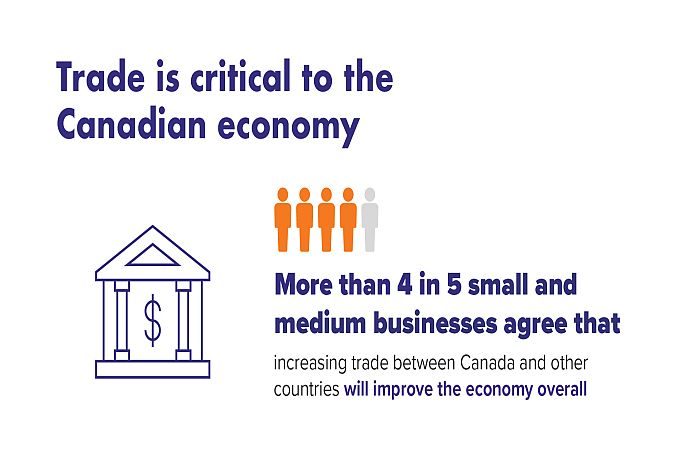TORONTO, Canada – Canadian small and medium businesses (SMEs) recognise that economic improvement and international trade are closely linked, with 83 percent agreeing that increasing trade between Canada and other countries will improve the economy overall.
This comes from the 2019 FedEx Trade Index, a poll conducted by Morning Consult on behalf of FedEx Express Canada, a subsidiary of FedEx Corporation. These interviews were conducted online using a panel of respondents. The goal of the research is to understand the impact of international trade among SMEs and as well as their opinions regarding the national economy.
The poll was conducted from September 17 to September 20, 2019, among 500 SME’s decision-makers in Canada.
“FedEx is committed to supporting trade policies that boost Canadian economic growth and competitiveness,” said Lisson. “Canada needs to pursue a comprehensive pro-growth, pro-competitiveness agenda that can help strengthen our global economic leadership. With 99.5 percent of the world’s population outside Canada, we need to continue to find ways to reduce barriers to Canadian goods and services around the world.”
Nonetheless, on Friday, Canadian National Railway the largest Canadian railroad operator said it would cut management and union jobs, amid declining freight volumes, trade tensions an economic slowdown.
The company will lay off 1,600 employees in the United States and Canada, according to a report https://www.theglobeandmail.com/business/article-cn-rail-to-lay-off-1600-employees-amid-weakening-economy-trade by the Globe and Mail.
The action, which includes sending some of its employees on temporary leave, has already begun across its network, Canadian National Railway spokesman said.
Despite a majority of SMEs (57 percent) believing that increasing the amount of trade between Canada and other countries will help their business, only 37 percent of Canadian SMEs are currently selling goods online. This is in contrast with American counterparts, who are doing more business online (44 percent). While both Canadian and US SMEs share the view that trade is important to the economy, the poll confirms both are largely focused on local customers.
“These results are very clear when it comes to our country’s approach to trade,” said Lisa Lisson, president of FedEx Express Canada. “Put simply, it is vital that SMEs and their ability to compete on the global stage remains a priority in Canada, to contribute to economic growth. Looking at how we achieve this growth, we know there is a huge opportunity for Canadian SMEs to harness the digital economy – and they should absolutely be using it to their advantage.”
Looking more deeply at the impact trade has on SMEs who currently import/export, 81 percent admit that fees and tariffs have had a great deal or some effect on the growth of their business. Also within this group, nearly half (48 percent) of those surveyed say that variations in fees and tariffs have been a major challenge to their business; and 44 percent say that import and export fees have been a major challenge to their business.
While SMEs in Canada feel that trade is critically important to the economy and growth of both their country and their business, many face obstacles when engaging in trade. Nearly a quarter of SMEs in Canada who import or export goods (24 percent) say that fees and tariffs have impacted the growth of their business a great deal, representing a real barrier to Canadian SMEs when importing or exporting goods to and from different countries.
Both NAFTA and CUSMA (Canada-United States-Mexico Agreement) have positive support among SMEs in Canada. Nine in ten of those surveyed (90 percent) in Canada support NAFTA. A similar amount (86 percent) of SMEs in Canada expressed their support of CUSMA. SMEs feel that international trade will not only help the Canadian economy but their personal business as well. More than half of Canadian SMEs (57 percent) think increasing trade between their country and other countries will help their company.





